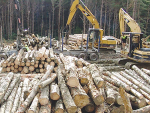“Fonterra talks about turning to higher value products, but they need to get on with it,” says Hughes, who is a UK professor of food marketing and an international speaker on food trends.
As the international dairy market grows, New Zealand domestic production will not keep pace so market share will decline. “You must go outside New Zealand to produce dairy which to a degree you are in China but you would expect more. But if you can’t keep up with sheer volume production at home you should produce higher value products, so your value share doesn’t decline.”
Sixty per cent of global growth in infant formula in the last five years has come from China and Hong Kong. New Zealand has provided the raw material, but infant formula is highly branded with the biggest global food companies, Nestle, Danone, Mead Johnson and Abbott Laboratories, having their own brands and 50% of global market share.
“Infant formula is largely milk powder with pixie dust and a strong brand. But the margins are made by the brand owners so you guys are commodity orientated and providing the raw materials.
“Fonterra does have an infant formula brand but it’s a very new one and still at the pilot stage, so it prompts the question, why weren’t you into that earlier?”
Brands are not in the New Zealand DNA, he says. “There are examples of good regional brands if you look in Asia: Anlene is an example, but there are too few of them. In history you see yourselves more as commodity producers and very, very good ones.
“As the cost of production in New Zealand increases because of higher land prices, more difficulties with planning regulations and environmental requirements, it would be helpful if you were into higher value products.
“This means intellectual property, patented special ingredients or more branded products. That’s a journey you are on at the moment but you still have a very long way to go.”
Hughes says Fonterra’s need to speed up its move to higher value products is a farmer problem. “Farmers own Fonterra. Farmers tell Fonterra ‘don’t do anything clever, just sell the milk powder for as much as you can and send as much of that money back to the farm’.
“That disallows Fonterra to invest in more R&D so they can develop specialty high value food ingredients, and it gives them insufficient budgets to invest at the level they need to in brands.”
The shift requires farmer leadership, he says. “They have to at some stage say ‘send less back, invest more in brands and R&D and in the longer term that will benefit us disproportionately’.
“But if you don’t allow that to happen, you will continue on the commodity path.”









